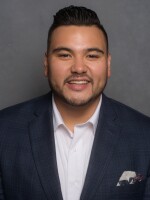Rev. Martin Luther King Jr. famously called 11 o’clock on Sunday morning the most segregated hour in Christian America. Sixty-four years later, members of two Northeast Ohio churches — one mostly white, the other historically Black — are meeting regularly to better understand race and develop friendships.

In 1997, leadership from the now New Covenant Lutheran Church, formerly St. James, a predominately-Black church in East Cleveland and the predominately-white First Lutheran Church in Strongsville, brought the men’s group of their churches together.
“We all took a look at the church and said this is really not how the church is supposed to look,” said Chuck Knerem, emeritus senior pastor of First Lutheran. “The church should look more diverse.”
Both sides meet monthly for lunch at the Cracker Barrel in Brooklyn, but it’s more than just meetings over meatloaf. The groups worship together. They do service projects together. Most notably, they have discussions about race.
“We wanted to show each church that we could cross this barrier of bringing a Black church from East Cleveland and this white church in First Lutheran together and realize how much we were alike,” said New Covenant Deacon William Brown.
Discussion topics will include bias, police relations and privilege.

The topic was family lineage at a discussion last summer. New Covenant vicar Scott Wylie laughed as he talked about the results of a DNA genetic test.
“I have the highest percentage for me, I think, is from Wales,” said Wylie, who is Black.
The results were possibly evidence of the fraught history of slavery and racism, particularly the rape of African slaves by white slavetraders and owners, he said.
“Oh, OK," Wylie told the group. "One of the masters was from Wales.”
Brown said stereotyping — especially how it relates to Northeast Ohio — was a big racial barrier he was excited to discuss.
"Understand that all of us is not what is portrayed on the media. You don’t have to be scared of us. You don’t have to be afraid that we’re going to take something from you,” Brown said. “You can come into East Cleveland and nothing’s going to happen to you.”
Even the ever-divisive topic — politics — has come up.

“I think a lot of our political views, we perceive that they’re the same, but that doesn’t mean that they are,” Brown said. “When we sit amongst each other, our camaraderie says, ‘OK, we don’t like what Trump is spewing, but you might go out and vote for him.”
Dale Piper from First Lutheran said he takes the group and the friendships it's inspired to the polls with him.

“I can’t not take into consideration what I’ve learned from this group the way I vote,” said Piper. “Sometimes when you’re voting between two people, it’s not like you’re voting based on their race record. You’re voting based on pro-life or pro-abortion, economy. You vote for many things when you vote for president. But I definitely take that into consideration in my vote.”
All these discussions, especially the hard ones, have built powerful friendships, said Marlon McPherson of New Covenant.
“The more we met, the more we communicated, the more we let our true feelings out, the closer we got,” McPherson said. “I’ve come to love these guys and their church because I’m accepted as a member of their church. I can walk into their church and the first thing is, ‘Hi Marlon, how you doing?’ For me it makes me feel like I’m a part of them and they’re a part of us.”
Piper said he feels the same.
“I try never to miss a lunch. I look forward to playing golf with Marlon. I’m very proud to be a member of this group,” Piper said.

The group hosts an annual retreat. Last fall it was an overnight cabin trip at the Hiram Camp House in Moreland Hills.
A few years ago, they visited the Jim Crow Museum of Racist Imagery in Michigan.
Knerem said one defining moment came in the early days of the group’s creation when they forced Black members and white members to pair up and discuss each other’s upbringings.
“To become that vulnerable in front of somebody else, for example, for me to admit that I grew up in a racist household and how that impacted me and my views and my perspectives about things, just opened up broader avenues for us not only that have a conversation, but to be in a deeper relationship with one another,” Knerem said.

Almost three decades later, with no signs of the camaraderie slowing down, the group looks ahead to keep things going for the next generation.
“God’s at work,” Wylie said. “It showed two churches coming together and then becoming brothers — I mean literally brothers. Can you imagine if our country was like that?”
The group already has plans for a trip to Washington, D.C. this summer. The priority stops are the African American Museum, the Martin Luther King Jr. Memorial and the Holocaust Museum.





